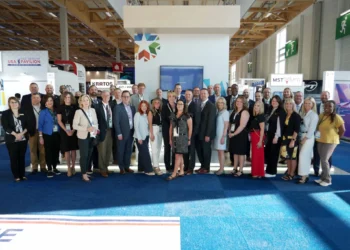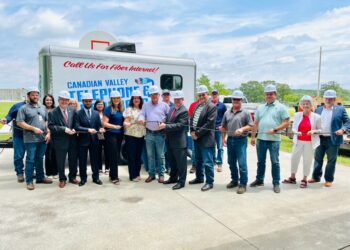OKLAHOMA CITY (OBV) – State Sen. Kristen Thompson recently took time to reassure Oklahomans that a newly created legislative committee will work hard to attract top companies to Oklahoma.

Numerous major companies, including Volkswagen, Panasonic and Tesla, looked at Oklahoma as a top candidate for their expansion plans, in recent years. But in each case, the company chose another state to build a massive manufacturing facility.
Sen. Kristen Thompson, R-Edmond, and Rep. Mike Osburn, R-Edmond, wrote Senate Bill 1447 and House Bill 3252 – complimentary pieces of legislation that chart a new course for accelerating economic and business development in the state.
“These near-misses inspired my legislative colleagues and I to ask: How can we enhance Oklahoma’s ability to recruit new businesses and support those already here,” Thompson said in her message.
Thompson was at the forefront of a comprehensive effort to revitalize economic development, a plan that involved creating entities within the Oklahoma Department of Commerce focused on business recruitment and retention.
“As a small business owner, I know how vital it is to foster an economic environment where employers can thrive and grow,” Thompson said. “That’s why I’ve focused on reforming the Oklahoma Department of Commerce and ensuring we maximize the return on investment for our state’s economic development projects.”
Thompson, along with Rep. Mike Osburn, R-Edmond, authored two bills, Senate Bill 1447 and House Bill 3252.
SB 1447 established the Oklahoma Office of Economic Development, Growth and Expansion (OkEDGE) and the Division of Community Outreach and Revitalization Enterprise (CORE) within the Oklahoma Department of Commerce. The bill also created the Legislative Evaluation and Development (LEAD) Committee, a legislative committee that will review certain incentive packages for relocating or expanding businesses.
HB 3252 modified the functions and programs of the Oklahoma Department of Commerce to ensure its focus is on economic development and community development.
The LEAD Committee is composed of five Senate members and five House members and is chaired by the Senate pro tem and House speaker. The committee will review and determine each economic development initiative’s viability and benefit to Oklahoma.
Thompson touted LEAD in a recent message to Oklahomans, saying the committee will help transform Oklahoma’s approach to business recruitment and retention.
She described LEAD as a 10-member, bipartisan and bicameral committee that will review business recruitment, expansion and retention projects across Oklahoma.
The Department of Commerce offers incentive packages to secure lucrative economic development projects. Such packages typically include state and local tax incentives based on a company’s capital investment and job creation.
The LEAD Committee, which has already started having meetings, will review incentive package proposals to ensure that the state’s resources are used wisely while prioritizing new and existing business growth.
Thompson said LEAD’s oversight and transparency will help Oklahoma compete effectively while safeguarding public resources.
“I’m committed to keeping you informed about the LEAD Committee’s progress as we work to make Oklahoma a national leader in economic development. Together, we’re creating an environment where businesses can thrive, and opportunities can grow,” she said.
OkEDGE will serve as the state’s leading entity in matters pertaining to economic development, with a focus on recruiting companies to either expand or start in Oklahoma, as well as retaining companies that already exist in Oklahoma. Its duties will be as follows:
- Being empowered to strategically drive opportunities for economic growth and diversification across the state;
- Collaborating with local, regional and state entities;
- Coordinating the funding and investment activities of each element of the state’s economic development efforts and marketing campaigns to achieve better results for the state’s recruitment and retention of businesses; and,
- Acting as the principal point of contact regarding investment in this state for public officials, businesses and the public.
CORE will focus on the long-term development of local communities to increase competitiveness and enhance economic opportunities. CORE’s duties will pertain to local economic opportunities and economic development, including, but not limited to the following:
- Creating new and higher-quality jobs for the people of the state through long-term development of local communities;
- Maintaining communication of information between the department and communities through regional organization and representation;
- Carrying out policy development and research in support of the long-term competitiveness of this state;
- Providing technical assistance to local communities in securing federal funding, incentive availability and community development;
- Providing assistance and funding in development of potential sites for economic development;
- Coordinating with other state agencies deploying federal and state funds for infrastructure development including, but not limited to, the Department of Transportation, the Oklahoma Water Board and the Oklahoma Broadband Office; and,
- Assisting in compliance with the laws and regulations of economic incentives and economic development initiatives.
The original version of SB 1447 envisioned an entity that worked within the Department of Commerce, but was solely focused on economic development through business retention and recruitment. The entity would have been managed by a board of directors.
The bill was amended, with changes making OkEDGE part of Department of Commerce operations and scrapping the board of directors. The amended version of the bill added CORE to focus on developing Oklahoma communities so to make them more desirable for companies to remain in.
Osburn and Thompson said the essence of SB 1447 remains the same, with OkEDGE and CORE cooperating through unique functions to grow the state’s economy.
“They’ll be two separate divisions so that each division can be laser-focused on what it is that they do. The business recruiting and retention will be laser-focused on business recruiting and retention, and the community development side of things, which is kind of the rest of what Commerce does, can be laser-focused on that,” Osburn said. “They will work together, but they will have their singular focus, and I think that will work out way better.”

















